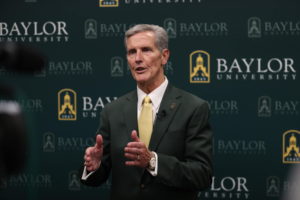Baylor receives positive report from accrediting agency
WACO—Baylor University has implemented all recommendations to safeguard student safety, provide administrative control over athletics and respond to sexual violence, an accrediting agency committee reported.
Last December, the Southern Association of Colleges and Schools Commission on Colleges placed Baylor on a one-year warning for noncompliance regarding student support services, control of intercollegiate athletics and institutional environment.
In early October, a special committee from the commission visited Baylor’s campus and found the university compliant in all three areas.
“The committee found that the institution operated with integrity and has responded to all requests with clarity and truthfulness,” the visiting committee’s report stated.

The findings of this committee represent a preliminary assessment of the university. Final action on the report rests with the SACS Commission on Colleges. The committee report will be reviewed in early December as part of the SACS Commission on Colleges annual meeting.
“We are certainly pleased with the findings of this special committee, as they confirm the significant actions Baylor has taken in response to the issue of sexual violence and the transformation that has occurred on our campus in a short time,” said President Linda Livingstone, who noted Baylor remains fully accredited by the agency.
“We look forward to the commission’s final decision regarding the warning sanction and stand ready to share our experiences, policies and practices with other institutions as we all work together to end the scourge of sexual violence.”
In particular, the committee noted Baylor:
- Developed “intentional and purposeful strategies to address student support services related to Title IX.”
- Took “significant steps toward ensuring that the CEO has control of all athletics.”
- Developed and implemented strategies to address student health, safety and security.
The committee also verified Baylor has implemented all 105 recommendations from attorneys formerly with Pepper Hamilton, the Philadelphia law firm Baylor regents hired to investigate the university’s response to sexual assault allegations and Title IX compliance.
As a result of the investigation, the board of regents removed Ken Starr as president, fired Head Football Coach Art Briles and sanctioned Athletic Director Ian McCaw. Starr later stepped down as chancellor and law professor, and McCaw resigned as athletic director.
Regents hear reports, take action
Livingstone presented an update on accreditation and the visiting committee’s report to the board of regents at its mid-October meeting in Waco, prior to Baylor homecoming.

“The board expressed a strong spirit of collegiality and a strategic focus of moving Baylor forward,” Chair Joel Allison said. “We had great dialogue and participation within our expanded committees, which means more representation and greater visibility of issues for all board members. We understand that restoring trust takes time, but we have tremendous new leadership in place with President Livingstone, and I believe we have a bright future ahead for the university.”
Livingtone announced several organizational changes and reported searches will begin soon for a permanent provost and a chief business officer.
“We are very pleased with how Dr. Livingstone has hit the ground running, making changes to her executive team to align with the university’s strategic direction and initiating a comprehensive academic strategic planning process, which the board fully supports and is excited about,” Allison said.
“Dr. Livingstone has been well-received by the Baylor Family and is working diligently to unify all who love Baylor around a shared future for the university.”
In other business, regents approved the purchase of 103 acres behind the Willis Family Equestrian Center and approved $1.2 million to relocate IT and utility lines in anticipation of the Interstate 35 widening project. The expenditure will be funded through prior construction easements received from the Texas Department of Transportation.
Based in part on reporting by Lori Fogleman of Baylor University.